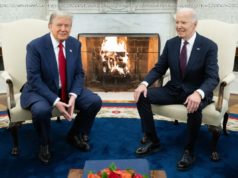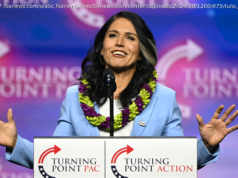We know a thing or two about defending democracy. So do you.
“Ukrainians don’t care who will be president of the United States,” my boss, the editor in chief of one of the largest television stations in Ukraine, told me in 2012 as I headed overseas to cover the American election. I was at the Obama campaign’s headquarters, in Chicago, when the president gave his victory speech that year—but back then, Ukrainian television didn’t broadcast live at night, so my report didn’t air until the next morning, local time.
Covering the 2024 U.S. election for the Ukrainian media was an entirely different experience. People in Ukraine were following every turn. Multiple Ukrainian radio stations called me for reports from the rallies I’d attended in Saginaw, Michigan, and State College, Pennsylvania. Ukraine is at war, and the United States is its biggest provider of military aid; the future of that relationship was at stake. The contest’s eventual winner, Donald Trump, had promised to end the war in 24 hours—which Ukrainians understood to mean that he intended to sell our country out to Russia.
But for me, that was only one dimension of this election’s significance. I’ve covered five American presidential contests for the Ukrainian press, starting in 2008, and in that time, I feel that I have witnessed an American transformation that resonates uncomfortably with the Ukrainian past.
After Ukraine became independent, in 1991, our political parties were for decades run from the pockets of oligarchs. A handful of unimaginably wealthy men, each with holdings in media and industry, controlled factions of political representatives who competed almost exclusively with one another. Political campaigns lacked substance and consisted mainly of personal attacks. In the United States in 2008 and 2012, by contrast, the candidates had real constituencies and actual debates about health care and the economy. Many Ukrainians envied the strength of American institutions, media, and civic engagement.
Sure, I was a bit stunned when, at a 2008 John McCain rally in Columbus, Ohio, California Governor Arnold Schwarzenegger warned voters that socialism was on the rise and would destroy America the way it had his native Austria. I had just been to Youngstown, Ohio, where I’d interviewed laid-off workers who lacked basic health care; Austria, meanwhile, was a country I knew well, and it had one of the highest standards of living in the world. Why would an elected official peddle such nonsense to this enormous crowd? Still, American democracy seemed, to an outsider, like the picture of health.
The roles had all but reversed when I came back in 2016. Ukrainians had risen up in 2014 against the corrupt, Russia-backed government of then-President Viktor Yanukovych. Our transition wasn’t perfect, but we elected a government that was at last serious about reform. The Kremlin responded by occupying Crimea and assaulting eastern Ukraine, where it backed separatists in the Donbas region. A low-level war would continue in the Donbas straight up until Russia’s full-scale invasion of Ukraine, in 2022. Even so, we were building up our democracy. Something was happening to America that seemed to point in a different direction.






